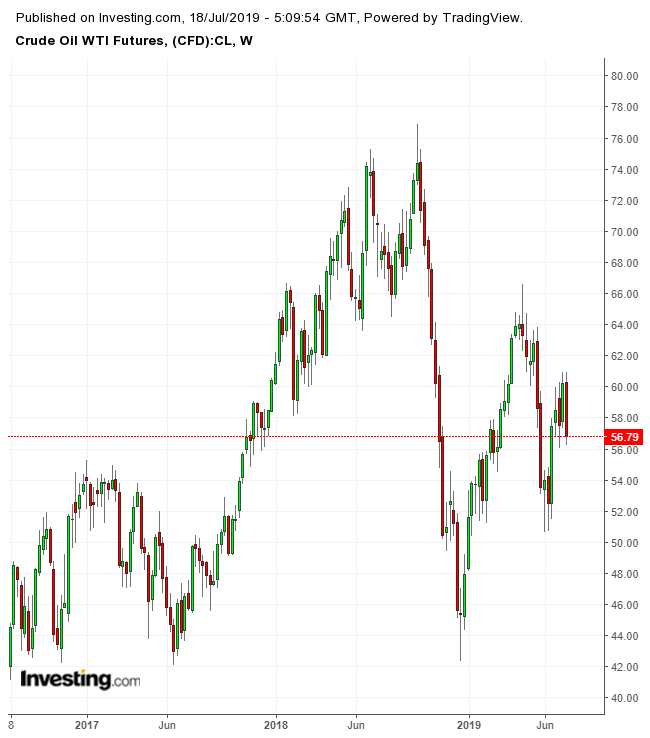Larger global events shined a light on the stability of the oil market last week. While the Hurricane in the Gulf of Mexico proved to be less damaging than feared, it still impacted U.S. oil production. At the other end of the globe, even the possibility that tensions might ease between Iran and the U.S. sent prices down, revealing that the market has already priced in a negative scenario.
Although Hurricane Barry did not inflict lasting or severe damage on the Gulf region, its effects are evident in the weekly energy data reported by the EIA. Data for the week of July 12, released yesterday, revealed decreased exports for both crude oil and petroleum products. These were offset by lower imports, also a result of the storm.
However, crude oil production showed a significant decrease due to the closure of over 1 million barrels per day of production from offshore oilrigs. All told, the EIA data presented a draw from crude oil stores, but not as large as expected. Offshore oil production did not resume until early this week so traders should expect to see decreased crude production reflected in the statistics released next week as well.
Data on product inventory in the U.S. (gasoline and distillate) also illustrated a larger than expected build. Gasoline inventories rose by 3.6 million barrels and distillate inventories increased by 5.7 million barrels. The temporary suspension of some exports due to the hurricane explains some of the product build, but it cannot explain all of the demand weakness for distillate, a product used in diesel fuel.
Gasoline and jet fuel demand have been strong throughout 2019, but distillate has shown consistent weakness. There are two primary reasons for this. The first is that the trade war with China has injected a significant amount of uncertainty into industries that use diesel fuel for transportation. The second is that the trucking industry is weak now, and is using less diesel fuel than in previous years. As well, flooding that occurred this spring in the Midwest continues to impact the agriculture industry and, as a result, it is using less diesel fuel this season for tractors and farm equipment.
In a sign that the oil market priced in tensions with Iran a while ago, the market reacted significantly to news on Tuesday that Iran may be willing to negotiate with the U.S. Iran said that it might consider negotiations on its ballistic missile program if the U.S. stopped selling weapons systems to Gulf countries like Saudi Arabia and the United Arab Emirates.

The mere possibility that Iran could contemplate negotiations sent WTI down 3.3%. Originally, crude dropped 4.2% when U.S. Secretary of State Mike Pompeo hinted that there could be potential to make progress with Iran. Overall, this shows that without the Iran tensions, oil prices would be lower, and absent of the start of a war, the prices are not likely to increase much based on the Iran situation.
